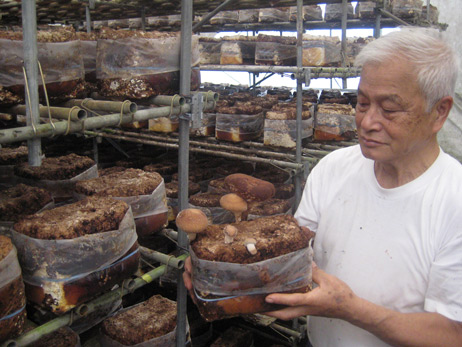Fukushima Logs Suspect In Mushroom
Radiation
Contamination

Fukushima Power Plant
EMF Protection Devices
Magnetic Field Detector
2011/09/08 | BY SATOSHI OTANI
FUKUSHIMA -- Food lovers often look forward to autumn and
winter, when the savory zing of mushrooms is found in hearty
soups and other tasty dishes.
But the fungi might be in short supply this year
following the disaster at the Fukushima No. 1 nuclear power
plant.
Mushrooms are thought to absorb radioactive substances
like sponges absorb water. Bans have been imposed on the
shipment of mushrooms from Fukushima Prefecture, one of
nation's main mushroom production centers, because of the
radiation leakage from the quake-stricken plant.
Tree logs, used as a medium to grow mushrooms, have
emerged as possible culprits for radioactive contamination.
The farm ministry and the prefectural government are busy
trying to come up with response measures.
"This is the biggest crisis in my 60-year-long
professional life," said 78-year-old Chusuke Saito, who
grows "shiitake" and Jew's ear mushrooms in Fukushima city.
Revenue has plunged to one-fifth the level before the March
11 disaster at his direct sales outlet. The wholesale price
offered to the farmers' cooperative has also been cut by
half.
According to 2009 statistics of the Ministry of
Agriculture, Forestry and Fisheries, Fukushima Prefecture is
Japan's eighth-largest producer of raw shiitake mushrooms
and the fourth-largest producer of "nameko" mushrooms.
Radioactive cesium exceeding the safety standard of 500
becquerels per kilogram was first detected in April in
shiitake mushrooms grown on tree logs outdoors. More cases
of radiation in Fukushima mushrooms were detected, and
shipment bans were put in effect in 16 municipalities. The
bans were still in effect as of Sept. 6.
Prices for mushrooms grown indoors in trays, like at
Saito's farm, are also plummeting.
It was initially believed that cesium discharged from the
stricken Fukushima No. 1 nuclear plant had settled on
mushrooms grown outdoors. In July, however, excess
radioactive substances were detected in shiitake mushrooms
grown indoors, indicating the possibility that cesium had
been absorbed from contaminated tree logs.
The farm ministry learned from a study on the 1986
Chernobyl accident that mushrooms had higher "transfer
factors," or rates of absorption of radioactive substances
from the soil, than rice, root vegetables and other plants.
The farm ministry plans to analyze the actual levels of
contamination in the tree logs and to publish, in the near
future, transfer factors from tree logs to mushrooms and
safety standards for using tree logs that contain cesium.
If tree logs are the culprits of contamination, that may
have far-reaching repercussions.
Tree logs used for fungiculture are harvested in winter
and are stored outdoors until they are inoculated with spawn
in spring. Cesium is likely to have fallen on tree logs that
lay outdoors when the nuclear accident occurred. Sawdust
used in indoor tray cultures is also made from tree logs, so
the possibility of contamination through that route cannot
be ruled out.
According to the farm ministry, Fukushima produced about
50,000 cubic meters of tree logs distributed in 2009,
topping all other prefectures. The prefecture accounted for
about 110,000 cubic meters of sawdust, or about one-third of
the total distribution in Japan.
Oak trees from Fukushima Prefecture, with their thin
bark, are said to be well-suited to fungiculture. The most
favored are the trees from the Abukuma mountain range
running along the Pacific Coast, which is close to the
Fukushima nuclear plant. The logs are distributed to all
parts of Japan, including Shikoku and Kyushu, sources said.
There is a possibility that contaminated tree logs and
sawdust have been shipped both within and outside Fukushima
Prefecture. This led the farm ministry to advise relevant
industry associations on Aug. 12 to refrain from the sale
and use of tree logs and other products from the prefecture
until their safety is confirmed.
The Fukushima prefectural government is also
investigating the destinations of tree logs and other
products shipped from the prefecture. The investigation
results are expected to be released shortly.
Contamination has been spotted in wild mushrooms as well,
dealing a blow to tourism activities.
"I never expected such a thing. I'm really embarrassed,"
said a member of a matsutake mushroom association in
Tanagura, Fukushima Prefecture.
Many people collect wild mushrooms in Tanagura. In
September, however, 56 times the safety standard of cesium
was detected in wild "chichitake" mushrooms, and a ban was
imposed Sept. 6 on shipments of "matsutake," which belongs
to the same species group.
The mountain is usually open to mushroom gatherers in
late September, but that looks difficult this year. The
Mushroom Festival in October was also canceled.
The matsutake mushroom association has taken care of
mushrooms using entrance fees collected from gatherers. Last
year, the mountain had more than 100 daily visitors on the
best of days during the matsutake season that ran through
late October.
"What should we do now?" said the matsutake association
member. "The mountain may go to ruins if we don't take care
of it."
http://www.emfnews.org/store
|